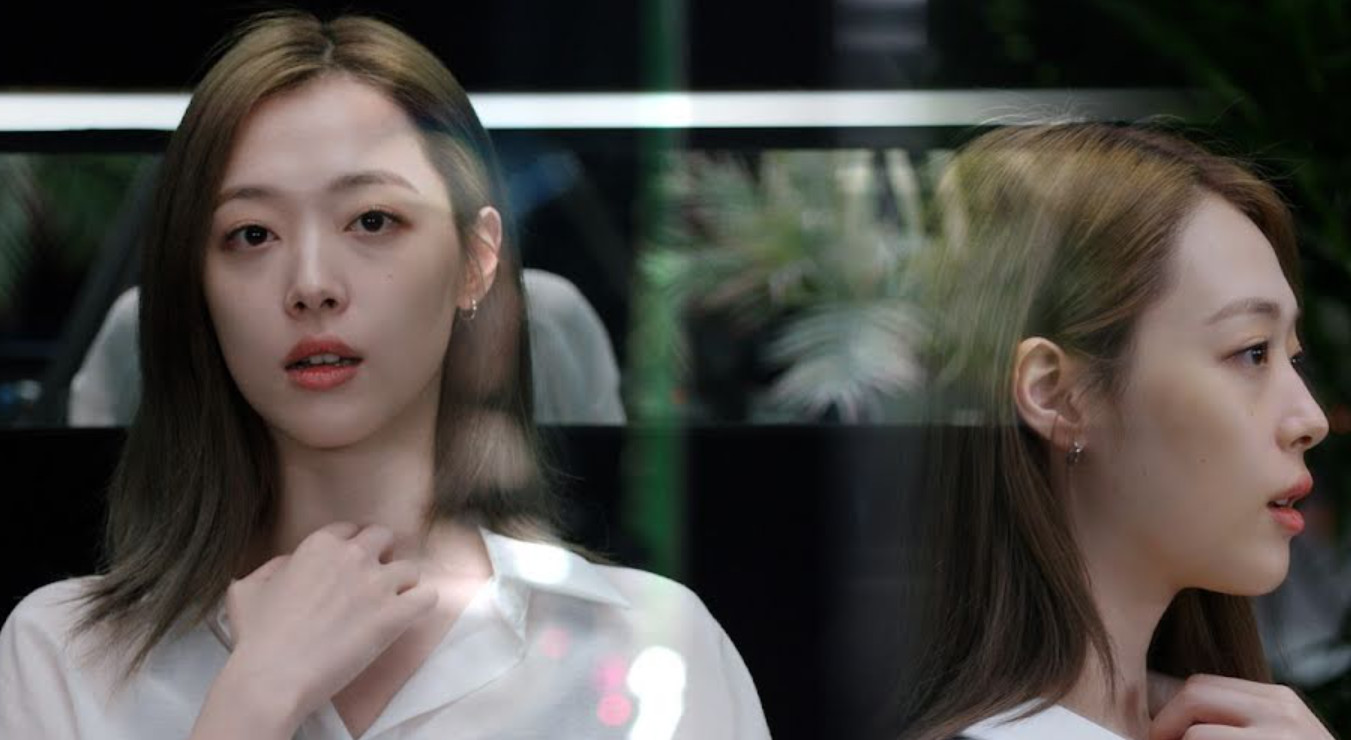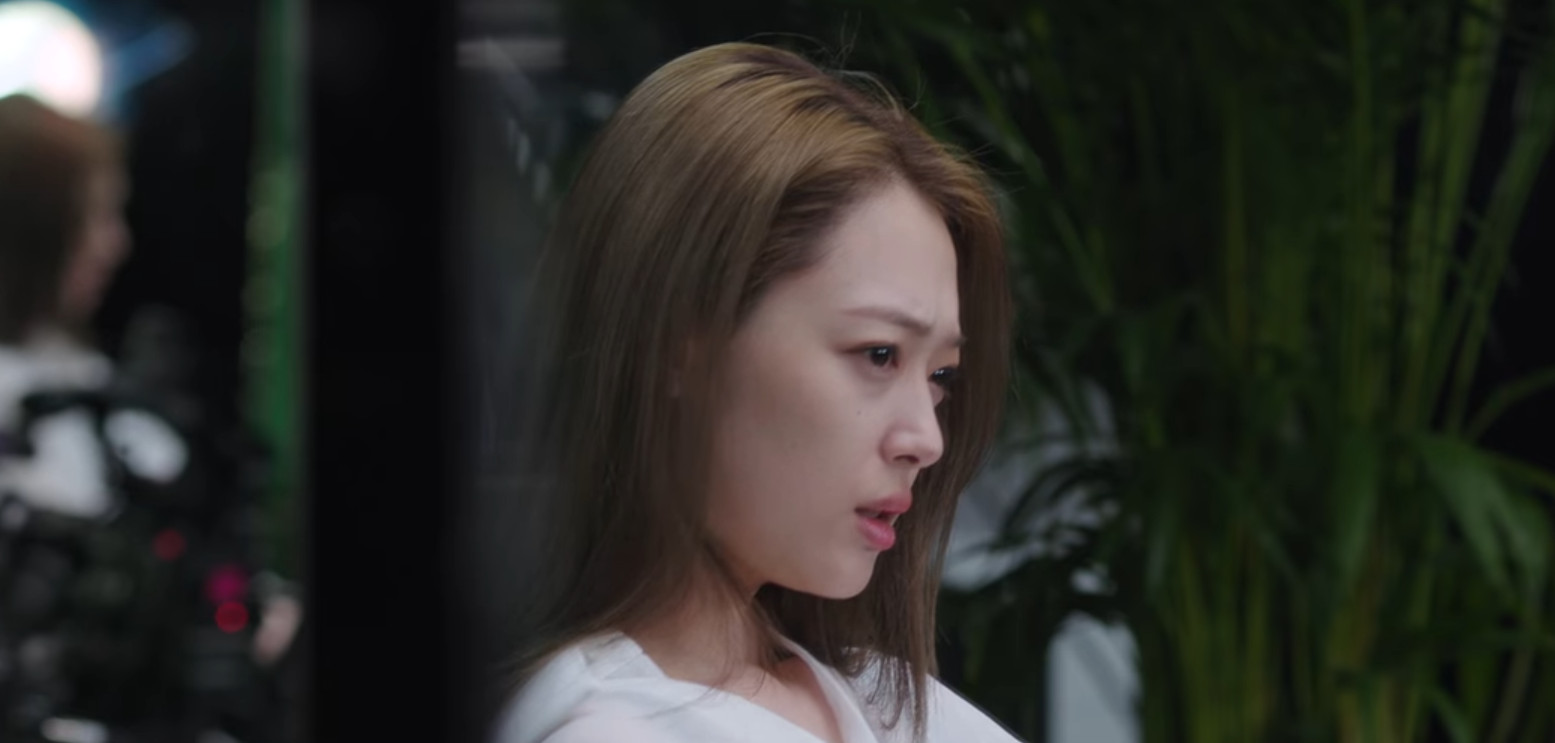Sulli‘s final projects, 4: Clean Island and Dear Jinri, have now been put up by Netflix, as was previously announced following its debut at the Busan International Film Festival. While obviously both parts of this project are of interest, it’s mainly the documentary feature that’s drawing attention, as it’s a lengthy and mostly uncut interview with Sulli on a broad range of topics.
Honestly, the whole thing was rather unsettling at first due to the nature of it all, but I’m also glad she got a chance to speak her truth on a variety of things and expanded on issues she felt strongly about that maybe people who only saw the controversy that surrounded her didn’t get at all.
Whole thing is worth watching, but I transcribed parts of select topics. Obviously a content warning on, like, the whole thing.
——
On “Pretty”
“To be honest, thinking I was superior* was something I just had to do in the K-pop industry. Competing with others from such an early age, I couldn’t help but think that as a way to keep myself form getting hurt.“
*Sulli later says she didn’t see herself as “superior”, but that it was more about having to see herself as ‘better’ in terms of being ‘prettier’ than others.
“I think I was always bound by this idea of being pretty, specifically the word ‘pretty’. … Whenever people called me pretty, I was curious to know why people said it and what makes them say those words to me. I felt like I had to keep acting pretty. I actually got told off, too, for not behaving, for not being the pretty girl. It always caused some resistance inside me.“
“Quite often I hated myself for looking pretty. I think it’s connected to the environment I was in. ‘You are born as a pretty girl. You don’t have to know anything. Just sit among these people and amuse them. Then they will love it. Your look itself will please them.’ Always along those lines. I don’t know what to say. I had so many thoughts about appearance. Seriously, isn’t it obnoxious? If I say it’s tough being pretty, it’s obnoxious.“
On K-Pop, Being A Product, And Unionizing
“Oh, K-pop. Being a K-pop idol is the worst.“
Director: “Do you think idols need a union?“
“Of course they do. I’m pissed, we definitely need one. I don’t feel people think celebrities are human. They don’t see us as humans. When I started out in the entertainment business, there was one thing people wouldn’t stop telling me, which I didn’t think was absurd back then: ‘You are a product. You need to be the finest, top-quality product to the public. That’s what you are.’ Even when they didn’t say I was a product, everyone treated me like one. I had to be what they wanted me to be. I had to fear losing my product value. For one thing, in my case, I couldn’t give voice to my opinions. I didn’t know how to speak up. I didn’t even know if I could at all. When I did speak up about my difficulties, the system wasn’t going to change. Nobody told me ‘make your own choice’, ‘it’s up to you’, ‘what do you think’, ‘how are you these days’. I sound like I’m bad-mouthing K-pop. You know Nikita? It’s just like that movie. We were basically puppets. Who cares if I’m exhausted?“
On Dealing With Pressure, Lack Of Freedom, And Fame
Director: “It seemed you were under strict control and constraints. How did you deal with such pressure?“
“For me I just kept blaming myself. That’s what I did. The only thing I could control, the only time I felt in control, was when I was when I was giving myself pain. The only thing I could ever control was to blame myself and to put myself down. That was my way of being in control. The kind I was capable of. It was tough but it probably kept me going.“
Director: “Maybe the problem was the system itself, not necessarily you. You never think, ‘It could be someone else’s fault?’ To blame somebody else but yourself?“
“No.“
*Asks Permission To Cry*
“It was not an option for me. When it did cross my mind at one point, everything collapsed. When I thought for myself for the first time and expressed how I was suffering, all these burdens on my shoulders … no, I couldn’t think of it that way. It wasn’t allowed. As I began to express my own thoughts, I was able to think deeply about myself. The basic stuff like what I like, what I don’t like, and if I feel bad, why I feel that way. It’s like that … The Matrix, is it? The choice between the red pill and the blue pill. They ask if you want to know the truth about reality and suffer with that knowledge or just ignore it and live on. It’s a dilemma. When I had to choose at a certain point. I wanted to know what reality was. But if I didn’t take the red pill and kept going without knowing anything, my life would be happier … maybe? I do wonder now and then.“
“This thing, fame, it showed up so abruptly. I understood what it means to be famous, but I was scared too. I always felt like it was a bubble. So I tried not to see it. I tried to turn away.“
On f(x) Members
Director: “What did you care about the most?“
“It was the people. Each member … I don’t think anybody gets this, but when you lose a member in a group, you’re left with a huge void. Every one of us was part of the sisterhood. I loved them. We had each other’s back. We told one another we’d get through it as a team.“
On Feminism And Supporting Women
“All the things I’ve done in my social media, I did them because I wanted to. My actions and my mindset, at a fundamental level, were in line with those who supported feminism. ‘Women shouldn’t do that.’ ‘Women shouldn’t talk so loud or have strong opinions.’ These were the opposite of who I was. I didn’t like what they were saying. Men talk openly about sex or about their desires or discontent. Men are praised for being blunt about those things, but when women do the same they are rebuked for being too vulgar or opinionated. Even when I don’t agree with some women, I’ve come to root for them for being empowered enough to speak for themselves. Simply for that. I thought we needed more women to speak up. Women can be wrong too, women can get angry and be inappropriate too. For example, I go braless because I think it looks more beautiful. If the whole world picks on me, and I believe I did nothing wrong, I tend to stick to my beliefs. Sometimes I know I will get cancelled for no good reason, and when that really happens I just think, ‘I knew it.’ And I kept going with what made me feel good.“
“I’m not sure what’s more important or what others might think, but I feel I’ve accomplished much bigger freedom. I’ve also liberated myself from the shame that I’d known and suffered alone.“
On Harassment & Rumors
Director: “On the other hand, there were also cases in your life where women were the perpetrators. Like the person who spread a hateful rumor about you. I wanted to hear your feelings about this.“
“Well, she probably didn’t know things would turn out that way. I mean, people gossip all the time. Some say it’s the best pastime. She was just unlucky and got caught.“
Director: “Why did you forgive her?“
*Crying*
“I think as I pursued litigation I was hurt even more, taking legal action. It didn’t make me feel better. It didn’t sooth my anger. It only continued to hurt. When I heard they found the person, it hurt. When I heard she was feeling deeply sorry, it still hurt. I guess at that time, it simply hurt to get an apology. Whatever it could’ve been, at least back then coming from that person, it would’ve hurt the same however she apologized.“
On Acting
“Before I started acting, I didn’t have much interest in other people. But as I started to wish there were fewer victims out there, I also began to think I might be useful somehow. I might be able to contribute something to it. From the beginning, I had to jump right into the big real world, and it made me confused about a lot of things. It made me want a sense of belonging, as well as the stability that comes with belonging.“
On Vulnerability & Opening Up
“I’ve always hated to show my weakness. I felt embarrassed. I often experience this sense of shame. And I decided I didn’t want to hide it anymore. Because getting puffed up doesn’t make me cool. Feeling sorry and saying you’re not doesn’t make me cool either. I hated to be someone vulnerable, but I’ve to think I might be stronger once I accept my vulnerability.“
——
Perhaps the most notable thing you won’t get from reading these quotes is how much silence there is throughout. It feels purposefully left in, showing when Sulli is thinking of how to answer a question or just doesn’t know what to say. This has mixed results, because it does make things feel at their most authentic and raw, but as the topics jump all over the place, it can definitely leave viewers who don’t know her whole story a bit lost and confused.
Sulli also seems generally unsure from start to finish. She laughs at not knowing how to introduce herself, and concludes by literally running out the clock on the interview. A lot of the time, she’s deep in thought or processing pain while trying to answer, and it can be unnerving to see somebody who so clearly was still finding her own identity in this fucked up world having to deal with everything she’s describing. That said, I will note that she was never more sure of herself than when she talked about the K-pop system, the f(x) members, and feminism.
Sulli also talks about her relationship with her parents, attitude towards love, what she figured out for herself at 20, and more. Overall, it’s worth watching for most fans of K-pop who know the general details about her career and life, as it’s perhaps the most real you’ll ever see a K-pop idol talk about … well, anything. It’s not an easy watch, but Dear Jinri made me appreciate her thoughtfulness and attitude more than I already did, and it also just made me wish she was still around.
======
If you are having suicidal thoughts, please contact a crisis center from your country.
 Asian Junkie Asian pop. Without discretion.
Asian Junkie Asian pop. Without discretion.

